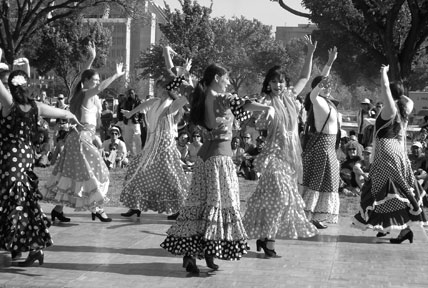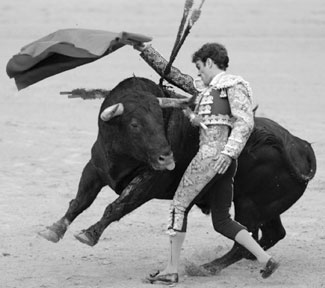|
The Enlightenment and its influence on Spanish /
Latin Cinema:
Carmen: An 18th century French opera adapted to cinema
 Last week I reviewed 'Danzon' which atempts to define contemporary
Mexican society through the feminine experience. I highlighted that
masculine gaze and agency are genuinely absent from the narrative and
examined how successful the film is as a feminist statement. While
writing the article and reflecting on its message, I thought about the
story of Carmen, which was originally a French opera by Georges Bizet. I
think it worth looking at the period in which the opera was written and
how the philosophy in Europe from the 17th and 18th century affected
society. Last week I reviewed 'Danzon' which atempts to define contemporary
Mexican society through the feminine experience. I highlighted that
masculine gaze and agency are genuinely absent from the narrative and
examined how successful the film is as a feminist statement. While
writing the article and reflecting on its message, I thought about the
story of Carmen, which was originally a French opera by Georges Bizet. I
think it worth looking at the period in which the opera was written and
how the philosophy in Europe from the 17th and 18th century affected
society.
|

Flamenco Dancers in Spain |
The opera is set in Seville, Spain, around 1830, which was the period
following the 'Enlightenment' in Europe. Art and literature during this
era reflected the huge changes in Western philosophy and intellectual
and cultural life. This obviously spilt over into early European cinema
and later impacted Latin American culture, art and cinema. A study of
European culture and cinema is useful in understanding the influences on
Spanish American literature and cinema.
The enlightenment
'The Enlightenment' is the era of Western philosophy which changed
the intellectual, scientific and cultural landscape forever. At its core
was the critical questioning of traditional institutions, customs and
morals, coupled with a strong belief in rationality and science.
Modernity is used to refer to the period after 'The Enlightenment' and
is a term used to refer to social conditions rather than one specific
philosophy.
The fact that the movement entailed questioning everything that had
previously been accepted as fact had a significant effect on the way
that people perceived the authority of the Church. This influenced
public perception of morality, relationships and gender roles and it was
against this backdrop that Carmen was written. The story is set in
Seville, Spain is about a beautiful gypsy with a fiery temper. Free with
her love, she woos the corporal Don José, an inexperienced soldier.
Their relationship leads to his rejection of his former love, mutiny
against his superior, a life of crime and finally his jealous murder of
Carmen. Although he is briefly happy with her, Don Jose falls into
madness when she turns from him to another lover. The opera premiered at
the Opéra Comique of Paris on 3rd March 1875. For a year after its
premiere, it was considered a failure, denounced by critics as "immoral"
and "superficial".
The work of Francesco Rosi
Carmen has been made into a film many times. The most popular is the
1984 version by Italian Director Francesco Rosi and in 1985, the film
was nominated for the Golden Globe Award for Best Foreign Film. Rosi was
born in 1922 in Naples and began his career in cinema as assistant to
Visconti, a highly acclaimed Italian Director of the early 20th Century.
Rosi also worked with Antonioni, Monicelli and other well know Italian
Directors. His highly accomplished early features, The Challenge (1958)
and The Swindlers (1959), reveal two important streams of influence on
Rosi's work. Italian neorealism - in particular, the operatic neorealism
of his mentor Visconti. It was with Salvatore Giuliano, his third
feature, that Rosi truly hit his stride and established his own
distinctive and highly influential style.
In subsequent films, Rosi would continue to hone his investigative,
scrupulously fact-based, neorealism-meets-modernism style, a genre
described by the director himself as "not a documentary way of making
films" (his films are certainly not documentaries) "but a documented
way." Powerful works such as The Mattei Affair built on the achievement
of Salvatore Giuliano and gave rise to the new post-Boom genre, which I
have been discussing in relation to Latin American Cinema. In a European
context, these were the so-called 'political' films of the late 1960s
and 1970s, many of which incorporated Rosi's investigative techniques.
These films also continued the inflammatory style of Salvatore Giuliano.
Rosi addressed corruption and abuse of power in the Italian
establishment and its institutions: the Church, state, industry and the
military. In the process, he frequently documented and attacked
collusion between political and government officials and the Mafia.
Rosi's 1984 adaption of Carmen
|

Spanish Matador and Bull |
Rosi's 1984 version of 'Carmen' stars Julia Migenes in the title
role, Plácido Domingo as Don José, Ruggero Raimondi as Escamillo, and
Faith Esham as Micaela. Lorin Maazel conducts the Orchestre National de
France. Julia Migenes-Johnson is magnificent in the title role. Her
strutting, her dark, messy, frizzy hair, her sexual availability and
aggression attract Don José and drive him crazy. This highly energetic
production was shot almost entirely in southern Spain. Many of the
scenes are filmed outdoors and feature beautiful pastoral landscapes, as
well as those drenched by the southern sun, the bull fight arena, and
colorful gypsy camps, lending an extraordinarily rich and open feeling
to the film.
The cinematography captures the settings and atmosphere perfectly and
the opening shots of the bull fight are exquisite and powerful. Carmen,
who, like the bull is true to her instincts, represents everything that
Don Jose, who represents the matador tries to repress. However, after he
has deserted the Army and lost the respectability that meant everything
to him, Don Jose thinks she owes him lifelong devotion.
Carmen has gravely misjudged the situation in thinking that she can
take him as a lover on her own terms an she finds herself hounded as the
raging bull is by the matador. Carmen is like a wild bull who would
rather be killed in battle than give up the freedom that she prizes so
highly.
The film culminates in a beautifully choreographed 'death dance'
between Carmen and Don Jose, which is juxtaposed with images of the bull
and matador.
Carmen stereotypes the romantic appeal of the gypsy, a wild and
exotic free-spirit who obeys no laws other than her own. She repeatedly
tempts the dignified Spanish soldier, Don Jose, with her elusive dark
charm and displays of passion, until he finally falls hopelessly in love
with her.
This proves to be his ultimate downfall, as well as her own. In the
end, Jose is purposely abandoned by the charismatic anti-hero, and - in
a fit of mad jealousy - kills her. There's an eerie beauty in Carmen's
death scene, because she seems totally incapable of fear. She's a brave
femme fatale whose endless schemes fail her only in the end. Don Jose
and the audience, both fall in love with her despite her moral flaws.
It is crucial to the story that Carmen was a gypsy, which somehow
allows her to get away with stealing; she can even ruthlessly steal the
soul of a man and still be described in glowing terms. Utterly
self-absorbed and selfish, Carmen is admirably independent.
Though manipulative and scheming, she is equally charming.
Emotionally empty and without any depth at all, she is nevertheless
intense and fully alive. She blazes and burns yet shows no true, human
warmth.
Carmen has all the qualities of a Narcissist and fits the description
to the extreme. She loves personal freedom above all else and flaunts it
unashamedly. She proclaims to love Don Jose, but then her love disperses
like smoke. The audience senses that perhaps Carmen never loved at all,
a trait giving her both an unflagging strength and ruthlessness. Don
Jose is to Carmen what psychologists call 'Narcissistic food' - Carmen's
huge ego swallows him up voraciously, because he's a challenge to her
and he idolizes her but then (when bored) she spits him out. He's soon
replaced by a brand new delicacy, another suitor who Carmen claims she
loves. Like the Narcissist, Carmen utterly disdains her own victim, and
moves from lover to lover like a carefree butterfly.
A brilliant mind player, Carmen uses Don Jose as both her
entertainment and enraptured audience. To Carmen, life is only a
lighthearted game, since her reckless nature is incapable of emotional
attachment or bonds. She soars through men's hearts freely and
unpredictably as a bird soars through air with no sign of empathy or
regret. All these characteristics portray the most malignant type of
Narcissist, who destroys those who love her most.
Bizet's opera, written against the backdrop of enlightenment
thinking, challenges gender stereotypes and behaviours.
Challenges to gender stereotyping
Carmen's character questions the Church's view that women should be
obedient, submissive and not particularly sexual. The fiery, wild,
sexual aggressor challenges the notion that men hold the balance of
power and are in control of their emotions and destinies. In a similar
way, the 1984 film adaptation challenges the traditional gender
stereotypes that persist into modern society. The audience is held
spellbound by Carmen and cannot help but be impressed by her
independence and defiance. Viewers cannot help but feel desperately
sorry for Don Jose as his relationship with Carmen deteriorates and he
spirals into begging and other desperate tactics.
The film succeeds in challenging gender stereotypes but does not go
as far as to deconstruct the male gaze through cinematography.
Nevertheless, the story negates the notion of male dominance in a way
that is overtly challenging to and distressing for a male audience. Men
cannot help but feel sorry for Don Jose and want him to stand up for
himself. 'Danzon' which was made seven years later goes as far as to
deconstruct the male gaze and questions stereotypes without disturbing
the male viewer. It is neither completely through the masculine nor the
feminine gaze that the audience views Carmen.
The viewer watches the drama unfold from a distance and is able to
interpret it from a subjective point of view, rather than through the
eyes of either of the key characters. Compared to 'Danzon' it would seem
that 'Carmen' draws closer to the ideal of true equality between the
sexes. Although Don Jose is effectively dominated by Carmen because of
his desire for her, he is not subjugated by traditional social mores but
rather by his own passion. Initially Carmen is empowered by her fierce
independence, as represented by the bull.
Don Jose is disempowered yet later, the score is evened as he comes
to represent the matador and kills Carmen. This is a metaphor for the
battle for supremacy between the sexes which ultimately results in a
sort of equality, however undesirable the outcome. |

